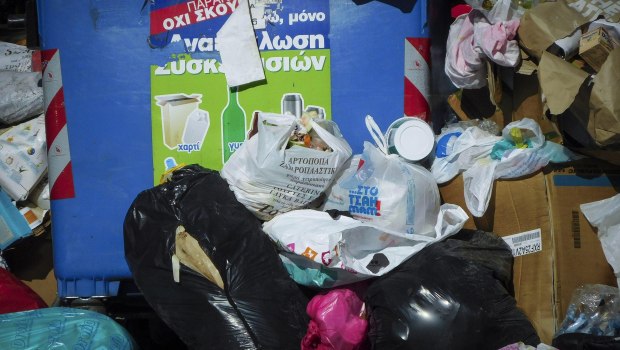Greece: Champion in visitor satisfaction but lagging in sustainability – What affects its
Source: Tornos News
Greece recorded an impressive level of visitor satisfaction in the second quarter of 2025, with an overall score of 9.1 – higher than the European average (8.8) – while all Regions scored above 9.0. Despite the strong image of hospitality and experience, the country lags behind in sustainability, showing large regional disparities and a low percentage of environmentally certified businesses compared with its competitors.
Visitors from the United States (9.3) and the United Kingdom (9.2) continued to report the highest satisfaction, giving particularly high scores in Regions such as the Peloponnese (USA 9.6) and the Cyclades (UK 9.2). Visitors from Germany (8.6), Italy (8.5), and France (8.4) rated Greece lower overall. High satisfaction was also recorded by visitors from Poland (9.7) and Hungary (9.5) in Thessaly, as well as by visitors from Bulgaria (9.5) in Central Macedonia.
These findings come from a recent INSETE report for the second quarter of 2025 (April–June), based on big data analysis and traveler reviews on platforms, social media, and travel websites. The study, carried out in collaboration with TCI Research/MMGY, records both the country’s overall online reputation and the level of visitor satisfaction in each Region.
Key points from evaluations on tourism websites (online travel agents, review sites, etc.):
- Satisfaction with Greece remained very high (9.1), above Europe’s overall score (8.8).
- The number of reviews rose steadily with the start of the summer season, reaching nearly 188,000 reviews in the second quarter.
- Satisfaction levels stayed high across the country, exceeding 9 in all Regions.
- Regional ranking: Western Macedonia (9.5), Thessaly (9.5), Cyclades (9.3), Ionian Islands (9.3), Central Greece (9.2), Western Greece (9.2), Central Macedonia (9.2), Dodecanese (9.1), Epirus (9.1), Peloponnese (9.1), Attica (9.1), North Aegean (9.1), Crete (9.1), Eastern Macedonia and Thrace (9.1).
- High satisfaction in less tourist-developed destinations highlights opportunities for expanding tourism activity across more areas of the country.
- High satisfaction in established destinations such as the Cyclades and the Ionian Islands demonstrates Greece’s ability to consistently and reliably meet international tourism demand.
Hospitality and the high level of service provided by tourism workers remain Greece’s most important competitive advantage. Therefore, making employment in the sector more attractive should be a priority for tourism businesses, as part of a strategy that also strengthens competitiveness and long-term sustainability.
On sustainability:
There are large variations between Regions. Increasing the number of environmentally certified businesses is a crucial step toward shaping a more responsible and sustainable tourism experience nationwide, capable of attracting younger and more environmentally conscious generations of travelers.
Climate and environmental challenges are among the main issues negatively affecting the country’s overall reputation, underlining the need for investments—mainly public but also private—in more resilient infrastructure, insulation, and meeting higher energy demands.
5th place in destination reputation in Europe
Analysis of online and social media data shows that most of Greece’s main competitor destinations saw a decline in their online reputation, following a general trend of deterioration. In this context, Greece also dropped and ranked 5th, while Athens—although also declining—performed significantly better.
According to the Net Sentiment Index (NSI)—a metric used in online and social media data analysis to capture the balance of positive and negative comments around a destination—Greece, with an average NSI of 39, ranks 5th. Croatia is 1st (66), Athens 2nd (61), Italy 3rd (51), Portugal 4th (49), Greece 5th (39), and Spain last at 6th (29).
What affects Greece’s reputation positively and negatively
- Online discussions about culture dominated with 50,106 mentions, strengthening Greece’s positive image with a high NSI score (87).
- Hospitality (79) and gastronomy (78) followed as sources of positive stories with high scores.
- Positive stories highlighted iconic attractions and experiences: Santorini, Corfu, Milos, and Zagori for natural beauty, and Knossos, Eleusis, and the Athens–Epidaurus Festival for cultural depth. Gastronomy boosted attractiveness, with mentions of olive oil tastings, vegetarian dishes, and traditional desserts, while hospitality was reinforced through references to local warmth and trend-aligned options (e.g. vegan accommodations).
- Negative discussions focused mainly on the environment and natural phenomena, with fewer mentions (8,108) but the lowest NSI score (60). These included the earthquake in Crete, floods in Paros and Mykonos, wildfires in Chios, and heatwaves. Protests against visitors linked to the Israel–Palestine war also had a negative impact.
- Ongoing TCI Research surveys confirm that climate and environmental challenges are among the main issues damaging Greece’s reputation, again stressing the need for stronger public and private investment in resilient infrastructure and energy solutions.
Experience components across the country
Gastronomy (9.2) received the highest ratings, followed by sea experience (9.1) and culture (9.1).
Hospitality and quality service remain the top theme in visitor comments, scoring 9.5, confirming Greece’s reputation. This was followed by value-for-money (8.9), sustainability (8.5), and hygiene (8.3).
Differences, strengths, and challenges by Region
Sustainability and hygiene showed the greatest variation across Regions. Greece currently ranks among the countries with the lowest percentage of certified units compared with its main competitors.
- Gastronomy: Ionian Islands (9.4), Crete (9.3), Dodecanese (9.3), and Cyclades (9.3) led in satisfaction, while Western Macedonia (9.5) also stood out, despite fewer reviews.
- Sea experience: Epirus (9.7), Attica (9.4), Cyclades (9.4), and Ionian Islands (9.2) received the highest scores.
- Culture: Thessaly (9.5) and Eastern Macedonia & Thrace (9.4) ranked top, with Central Greece (9.4) also exceeding the national average.
- Hospitality: Western Macedonia (10.0), Epirus (9.9), Central Greece (9.6), Thessaly (9.6), and Western Greece (9.7) excelled.
- Sustainability: Thessaly (9.7), Eastern Macedonia & Thrace (9.6), and North Aegean (9.4) achieved the highest scores. Cyclades (7.4) and Central Greece (6.7) scored comparatively lower, reflecting regional disparities.
- Hygiene: Central Macedonia (9.2) and North Aegean (9.2) scored above average, while Eastern Macedonia & Thrace (6.9) and Peloponnese (6.0) had weaker results.
The original article: belongs to Tornos News .




